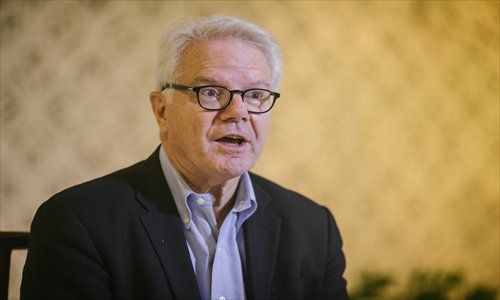Xi’s visit tackles serious concerns
Editor's Note:
Chinese President Xi Jinping embarks on his first state visit to the US on Tuesday amid concerns about the bilateral relationship and the Chinese economy. What should Xi and his US counterpart Barack Obama focus on during their meeting? What message can Xi's trip to the UN send? Several US experts shared their insights.
David Lampton, director of China Studies at the Johns Hopkins Paul H. Nitze School of Advanced International Studies and chairman of The Asia Foundation

David Lampton
I always believe that it's better to talk than not talk, so I'm definitely supportive of dialogues like the Strategic and Economic Dialogue (SED). But I must say that the last SED had 127 outcomes, frankly with 127 outcomes you almost have too many outcomes. It's very important, beyond working level of SED, that our two leaders get together and agree on the strategically most important issues. As a leader, you can't pay attention to 127 items. So the question is what is the most important one or two items that our leaders should pay attention to?
I would say two things. One is that we need to pay more attention to build interdependence because as we become more interdependent, that raises the price of conflict. The higher price of conflict, the less we will have.
We also need to have our two presidents to agree that the power relationships in the world are changing. In the 1950s, the US controlled more than 35 percent of global GDP. Now we control 17 or 18 percent. China controlled 2 percent of the global GDP then, now it controls 16 or 17 percent. So the institutions of the world have to begin to adjust to this changing power balance. That means China needs to be invited to play a bigger role. It's very important that our two leaders accommodate each other in the sense that the US would be willing to make room for China in the international system in a smooth, cooperative way.
Nathan Gardels, editor-in-chief of The World Post

Nathan Gardels
There are two levels in the China-US relationship. The relationship is on a solid foundation, as proved by the significant deal on climate change that Obama and Xi made last year at the APEC summit and their cooperation on Iran nuclear deal.
Those are two extremely important converging interests that China and the US are working on. But the drift is taking place, which is worrisome, on perceptions and reality of both China and the US. What I worry about more is public opinion than elites' opinion of China.
So I think it's important for Xi to speak to the public opinion more than to Obama. The public opinion is concerned about cyber war, jobs and the weakness of China on the economic front. They want to know that Chinese leaders are in charge and the economy is not going down.
Christopher Johnson, Freeman Chair in China Studies at Center for Strategic and International Studies

Christopher Johnson Photos: Li Hao/GT
One thing I see in Xi's behavior is that he may be one of the most confident Chinese leaders we've seen in a long time and he knows how to deal with the public. He did this during his US visit as vice president and I hope he would do it again this time.
Xi's visit to the UN is a great opportunity for him to put in an international multilateral context the discussions he has with Obama and to hopefully showcase the elements of the relationship because many things in the bilateral relationship are contentious at the moment.
The positive story of US-China cooperation is in the global sphere and working together on global issues, such as climate change and prevention of nuclear proliferation. What's missing at the moment is a strong message. After the global financial crisis, the US and China really took joint responsibility for responding to the crisis. With the concerns right now about the situation in China's economy and the effects that it has had on equity markets worldwide, it will be very helpful and useful to send strong message of cooperation and managing the global economy.
In managing new frontiers in the bilateral relationship, the primary area is frankness and transparency in our dialogue. A mutual language can be come up with to be able to discuss these difficult issues such as cyber security. Besides, we need to inject much more expertise into the process.
Read more in Special Coverage: